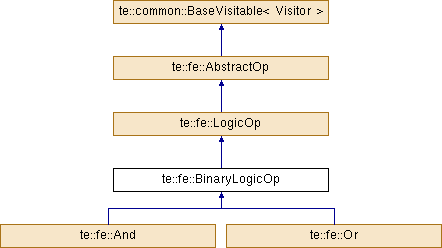A logical operator can be used to combine two or more conditional expressions. More...
#include <BinaryLogicOp.h>

Public Types | |
| typedef void | ReturnType |
| typedef Visitor | VisitorType |
Public Member Functions | |
| virtual ReturnType | accept (VisitorType &guest) const=0 |
| It call the visit method from the guest object. More... | |
Initializer Methods | |
Methods related to instantiation and destruction. | |
| BinaryLogicOp (const char *opName=0) | |
| It initializes a new BinaryLogicOp. More... | |
| BinaryLogicOp (const char *opName, AbstractOp *first, AbstractOp *second) | |
| It initializes a new BinaryLogicOp. More... | |
| virtual | ~BinaryLogicOp () |
| Virtual destructor. More... | |
Accessor methods | |
Methods used to get or set properties. | |
| const char * | getName () const |
| It returns the operator name. More... | |
| void | setName (const char *opName) |
| It sets the operator name. More... | |
Protected Attributes | |
Not Allowed Methods | |
No copy allowed. | |
| const char * | m_name |
| Operator name. More... | |
Accessor methods | |
| std::vector< AbstractOp * > | m_ops |
| Mandatory at least two. More... | |
| std::size_t | size () const |
| It returns the number of operands. More... | |
| void | add (AbstractOp *o) |
| It adds the operand to the operand list. More... | |
| AbstractOp * | operator[] (std::size_t i) const |
| It returns a specified operand. More... | |
| AbstractOp * | getOp (std::size_t i) const |
| It returns a specified operand. More... | |
| BinaryLogicOp * | clone () const |
| It creates a new copy of this object. More... | |
Detailed Description
A logical operator can be used to combine two or more conditional expressions.
The following operators are defined in the Filter Encoding specification:
- See also
- LogicOp, UnaryLogicOp
Definition at line 58 of file BinaryLogicOp.h.
Member Typedef Documentation
◆ ReturnType
|
inherited |
Definition at line 58 of file BaseVisitable.h.
◆ VisitorType
|
inherited |
Definition at line 57 of file BaseVisitable.h.
Constructor & Destructor Documentation
◆ BinaryLogicOp() [1/2]
| te::fe::BinaryLogicOp::BinaryLogicOp | ( | const char * | opName = 0 | ) |
It initializes a new BinaryLogicOp.
- Parameters
-
opName The BinaryLogicOp operator name.
- Note
- The BinaryLogicOp will not take the ownership of the given name.
◆ BinaryLogicOp() [2/2]
| te::fe::BinaryLogicOp::BinaryLogicOp | ( | const char * | opName, |
| AbstractOp * | first, | ||
| AbstractOp * | second | ||
| ) |
It initializes a new BinaryLogicOp.
- Parameters
-
opName The BinaryLogicOp operator name. first The first operand. second The second operand.
- Note
- The BinaryLogicOp will not take the ownership of the given name.
- The BinaryLogicOp object will take the ownership of the operands.
◆ ~BinaryLogicOp()
|
virtual |
Virtual destructor.
Member Function Documentation
◆ accept()
|
pure virtualinherited |
It call the visit method from the guest object.
- Parameters
-
guest The guest or visitor.
- Returns
- Any valid value define by the template type R.
◆ add()
| void te::fe::BinaryLogicOp::add | ( | AbstractOp * | o | ) |
It adds the operand to the operand list.
- Parameters
-
o The operand to be added.
- Note
- The BinaryLogicOp object will take the ownership of the operand.
◆ clone()
|
virtual |
It creates a new copy of this object.
Implements te::fe::AbstractOp.
◆ getName()
|
inlineinherited |
◆ getOp()
| AbstractOp* te::fe::BinaryLogicOp::getOp | ( | std::size_t | i | ) | const |
It returns a specified operand.
- Parameters
-
i The index of desired operand.
- Returns
- A specified operand.
- Note
- The method will not check the index range.
◆ operator[]()
| AbstractOp* te::fe::BinaryLogicOp::operator[] | ( | std::size_t | i | ) | const |
It returns a specified operand.
- Parameters
-
i The index of desired operand.
- Returns
- A specified operand.
- Note
- The method will not check the index range.
◆ setName()
|
inlineinherited |
It sets the operator name.
- Parameters
-
opName The operator name.
Definition at line 89 of file AbstractOp.h.
◆ size()
| std::size_t te::fe::BinaryLogicOp::size | ( | ) | const |
It returns the number of operands.
- Returns
- The number of operands.
Member Data Documentation
◆ m_name
|
protectedinherited |
Operator name.
Definition at line 123 of file AbstractOp.h.
◆ m_ops
|
protected |
Mandatory at least two.
Definition at line 148 of file BinaryLogicOp.h.
The documentation for this class was generated from the following file:
- /home/castejon/castejon_files/develop/terralib5/git_release/src/terralib/fe/BinaryLogicOp.h
